Hanukkah
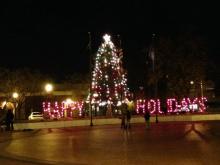
It’s beginning to look a lot like Christmas here. But Hanukkah? Not so much.
In this town of about 90,000 residents, including a large Jewish enclave, a complaint over a menorah set up beside a decorated Christmas tree in Town Square has triggered the menorah’s removal and upset numerous residents and at least one downtown merchant, who says township officials acted rashly.
For decades, Lakewood’s display has featured a Christmas tree and a small menorah. No one has complained until now, township officials say.
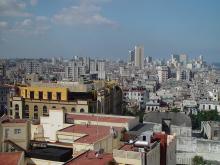
Alan Gross, the Jewish international aid worker held on alleged spy charges in Cuba for five years, was freed on Dec. 17 — what some are calling a Hanukkah miracle on the first day of the holiday that celebrates religious freedom.
Gross, 65, of Maryland, has always claimed that he only went to Cuba to bring communications equipment to the small Jewish community left in Havana. However, the Castro government said he was part of a spy network attempting to set up a secret network for Cuban Jews. Gross was serving a 15-year sentence.
President Obama chose the Dec. 17 release as a springboard to announce a massive historic “normalization” of U.S.-Cuba relations. Meantime, in Cuba, President Raul Castro, who held a press conference in Havana at noon, was expected to release 53 Cuban political prisoners.
Obama particularly credited the “moral example of Pope Francis,” who actively encouraged Gross’ release. Francis, who held private meetings at the Vatican to secure the deal, praised the move, sending “his warm congratulations for the historic decision taken by the Governments of the United States of America and Cuba to establish diplomatic relations, with the aim of overcoming, in the interest of the citizens of both countries, the difficulties which have marked their recent history.”
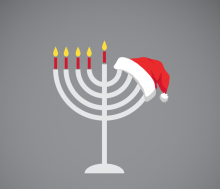
Christians don’t seem to mind that so many beloved Christmas songs were written by Jews — and Jews tend to reel off the list with pride.
"White Christmas." "Let It Snow." "Santa Baby." "I’ll Be Home for Christmas." "Chestnuts Roasting on an Open Fire." "Silver Bells." "Rudolph the Red-Nosed Reindeer."
Those not mentioned here could fill an album.
But why didn’t the Jews write any similarly iconic songs for their holiday that falls around Christmastime — Hanukkah, the Jewish Festival of Lights?
“I Have a Little Dreidl"? Great song … if you’re 4.
There are reasons that Jews are good at Christmas songs and why so many of these songs became so popular. And there are reasons why Jews didn’t write similarly catchy tunes for Hanukkah — or any other Jewish holiday.
But first, a little music history.
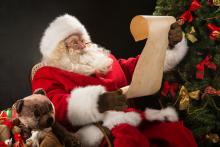
On behalf of Christians everywhere, this holiday season I’d like to extend an olive branch (some assembly required; batteries not included) to the non-Christian faith community.
More than 2,000 Christmases have come and gone, and it’s time. It just is. It’s time for one of you to step up and adopt-a-Santa, the Santa. Did I say “please”? Write him into the Ramadan tradition, or fold the jolly old elf into Hanukkah. Put some Kringle in your Karma. Let Rudolph’s nose illuminate the path, the way. How hard can it be?
I’m serious — we’re tired of him, because spiritually speaking, Santa Claus is a colossal pain in the wassail.
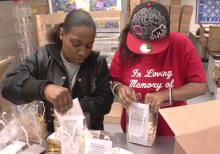
This is Giving Tuesday, when nonprofits of every stripe hope to attract some of the billions of dollars to be spent during the Hanukkah and Christmas season.
Many of those dollars will go to religious groups. Now, new research is expanding the meaning of “religious giving.” It counts motivation for giving, and measures not only gifts to houses of worship but also donations to faith-connected nonprofits that are doing secular service such as fighting poverty or offering job training for the disabled.
“Most people cite their religious commitments, but most also cite the belief that they should give to benefit others. Many people hold both these impulses at the same time,” said Shawn Landres, a co-author of the research report, “Connected to Give: Faith Communities.”
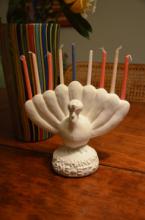
It last happened in 1888 and, according to one calculation, won’t happen again for another 77,798 years: the convergence of Thanksgiving and Hanukkah.
This year, Nov. 28 is Thanksgiving and the first full day of the eight-day Jewish festival of lights, which begins at sundown the previous night.
For many Jewish Americans, this is no trivial convergence, but a once-in-an-eternity opportunity to simultaneously celebrate two favorite holidays, one quintessentially American, the other quintessentially Jewish.
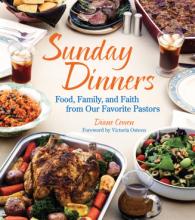
In the Bible, few dine alone.
Small wonder that Christians and Jews see sharing a meal with family, guests, and strangers as a form of spiritual nourishment and hospitality — as valuable as the bread passed around the table.
Although the holiday season’s family feasts are fast approaching, many say it’s the weekly family meal that matters most across time.